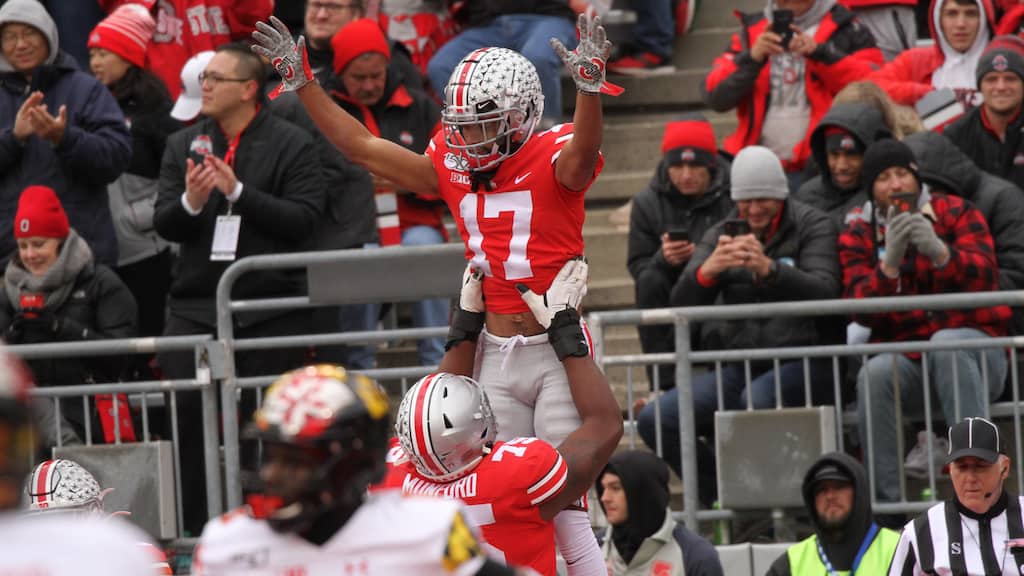Table of Contents
Learn how to bet totals.
Key Points
- Learning how to bet totals is a huge advantage for a sports bettor.
- Sports Hub can help you learn how to bet totals in a large number of sports.
How to Bet Totals

Betting on game totals is one of the most common sports bets. It’s a pretty simple concept even for the most inexperienced of bettors.
Totals bets are common in sports like football and basketball and even in lower scoring sports like baseball and hockey. There are totals bets in other niche-type betting sports like tennis, too.
As mentioned, betting on a game total is not very complicated. Bettors wager on the final combined score of both teams to go Over or Under a set number. Totals bets are often referred to as Over/Under bets.
In this post, Sports Hub offers you an in-depth lesson on betting totals. We explain how the bet works, take a look at different strategies, and identify how to bet totals in different sports.
History of Totals
Point spread bets have been around for a long time. We can trace point spread betting back to the 1940s. The first totals bet wasn’t taken until 1964. The Del Mar Sports and Race Book took a bet on a Dodgers-Reds game that year.
A customer wanted to place a bet on the Dodgers-Reds game ending in a shutout. The sportsbook reframed the bet as the first-ever totals bet. The customer was able to bet on whether the total runs in the game would go Over or Under 3.5.
Totals bets started to grow in popularity as more sportsbooks began offering them. Today, the most common bets in the four major North American professional sports leagues – NFL, NBA, MLB, and NHL – are moneyline, point spread, and totals bets.
How Totals Betting Works
A bet on a game total is a pretty straightforward wager. The bettor can find game totals and their odds set by oddsmakers at any given sportsbook. The bettor then places a wager on the Over or the Under.
A bettor that wagers on the Over in an NBA game, for example, bets that the final combined score will be more than the 225 established by oddsmakers. When the game ends with a score of 120-117, the bettor is a winner.
Let’s examine the totals bet deeper with an example. Let’s say the Golden State Warriors are playing the Milwaukee Bucks. The bet might appear at a sportsbook as follows.
Golden State Warriors O 229.5 (-110)
Milwaukee Bucks U 229.5 (-110)
The total, as you can see, is set at 229.5. Oddsmakers like to set totals in increments of 0.5. This avoids a ‘push,’ which occurs when the final score lands exactly on the total. In the example above with a total of 225, if the game had ended with a score of 115-110, the result is a push. All bets are refunded and there are no winners.
In the Warriors-Bucks example, games can’t end in increments of a half-point. There will be a winner and a loser. Let’s say you have used Sports Hub to do some research on both teams. Maybe you even used Sports Hub to check out handicappers that offered a free pick on the game.
Placing a Totals Bet
After you have finished, you decide that you like the Over. You are going to bet on the Over at odds of -110. If you don’t already know, the odds will determine your payout. These American odds work in relation to bets of $100.
In this case, to win $100, you would have to bet $110. Let’s say you put $110 on the Over. The Bucks win 118-112. That’s a combined 230 points, which is more than the posted total. You get your stake of $110 back plus your winnings of $100.
You don’t have to bet $110. If you had bet $100, you would win $91. A simple $10 bet would result in winnings of $9.09.
Sportsbooks can change these odds. They are not always -110. They can also adjust the total itself. They do this for a number of reasons.
Totals Betting Odds
Sportsbooks are in the business of making money. If they don’t make money, they go broke. That’s pretty much any business’s model. Sportsbooks are no different.
Imagine you and your buddy make a totals bet on a game. You like the NFL game to go Over 50 points and your buddy takes the Under. The bet is for $20.
When the game ends, the final score is 27-21. That’s a total of 48 points and you are a loser. You take your $20 and give it to your buddy who now has $40 total. What if you could have taken that bet, lost, but still made money?
Say two of your friends made the same bet. They each give you $20 to hold until the game ends. One guy wins the bet and you give him his $20 back plus the $20 from your other friend.
However, what if you charged a small fee for taking the bet? Instead of giving the winner $40, you give him $38 instead. That is basically how sportsbooks work. The key for the sportsbook is to take in an equal amount of action on both sides of a bet. Then, they are guaranteed to make money.
To learn more about how sportsbooks operate, you can check the Sports Hub library. In addition to how to bet totals, you will find helpful information on anything and everything sports betting.
Why Totals Odds Move
In order to eliminate liability, oddsmakers aim to set a total where there will be equal action on both sides of the bet. Naturally, one-sided action does occur and that forces sportsbooks to adjust the total. They can also adjust the odds.
For instance, if most bets and money are being placed on Over 48.5 (-110), the line may change to Over 48.5 (-120), then to Over 49 (-110), adding one point and returning the juice to its starting point. From the moment the odds are published until the game starts, this process can be repeated.
Along with the amount of action, sportsbooks also consider where it is coming from. There are two categories of bettors, many of whom are recreational or casual bettors. A small percentage of them are sharps, or professional bettors, who wager a lot of money and win frequently.
Oddsmakers always try to interpret the action being taken to determine which side the pros are on. Sharp bettors are more well-respected by sportsbooks than the average bettor. This helps oddsmakers determine whether or not the line should move at all. Sportsbooks are also aware that sharps will be able to identify the value and profit from any errors made. The casual bettor is unlikely to be able to see that value and respond accordingly.
How to Bet Totals – NFL

Betting game totals varies by sport. Betting on the Over/Under in the NFL is different from that of the NBA or NHL. It’s important to understand some key concepts when learning how to bet totals on a specific sport.
When betting totals on NFL games, for example, one of the major factors that bettors should learn is the concept of NFL key numbers. Scoring in the NFL is different from other sports.
A touchdown is worth six points and a kicked PAT (point after touchdown) is worth one point. Field goals are worth three points and a run or pass conversion after a touchdown is worth two. A safety results in two points, a rare occurrence in NFL games.
The one-point safety, which only occurs on two-point conversions, has never happened in an NFL game. Understanding NFL scoring, we find some common final scores in NFL games.
More games in the NFL end with a final combined score of 41 points. The next six most common totals in the NFL are 43, 37, 44, 51, 33, and 47. Knowing these key numbers can help when betting on NFL game totals.
In a game featuring Kansas City and Buffalo, the total is set at 52.5. The bet might look like this.
Kansas City Chiefs O 52.5 (-105)
Buffalo Bills U 52.5 (-115)
The sportsbook thinks it’s more likely the total will go Under. This is reflected by the -115 odds. The Over is priced at -105.
Of the top seven most common NFL totals, the highest is 51. The Bills and Chiefs have great offenses, but going Over 52.5 points doesn’t happen a lot in NFL games. You bet $115 on the Under. When the game ends at 27-24, you win $100!
How to Bet Totals – NBA

Betting the Over/Under in NBA games is different from the NFL and other sports. NBA scoring occurs in increments of one, two, and three points. That’s it.
A free throw is worth one point. A field goal scored inside of the three-point arc is worth two points. All field goals scored from outside the three-point line are worth three points.
Unlike the NFL, scoring doesn’t dictate many key numbers in the NBA. As a result, it takes a bit more knowledge to bet on NBA totals.
NBA games usually have totals set between 210 and 240. Games anticipated to be more low-scoring affairs are assigned totals closer to the lower range of 210-240. Likewise, games that are expected to be high scoring will have totals closer to 240. Every season, a handful of games will have totals above 240 or below 210.
In the playoffs with two pretty good defensive teams, it’s not surprising to see totals of less than 210. To learn more about how to bet totals on NBA games, search the Sports Hub library.
Betting Baseball Totals

Bettors that wager on MLB totals have to understand a few things. Scoring is unlike the NFL or the NBA. A run is worth a run. There are some key numbers related to MLB totals though.
Baseball totals are dependent upon two factors – pitching and a batting lineup. There are certain pitchers in the game that consistently do not give up a lot of runs. Most starting pitchers do not throw complete games anymore. That means that totals are also dependent upon relief pitching.
There are some very difficult lineups to pitch through as well. The top scoring team in MLB is usually around 5.0 runs per game. The worst scoring MLB team is typically somewhere between 3.0 and 3.5 runs per game.
Now, the way baseball works, the home team bats last in the bottom of the ninth inning. What happens a lot is a game is tied or the home team is behind by a run or two headed into the bottom of the ninth.
Imagine a game tied 3-3 headed into the last at-bat. A single run breaks the tie and ends the game. This happens quite a bit in MLB games. The 4-3 final score is the most common in baseball. Next up is 3-2.
The key numbers in baseball are 7, 9, and 11. About 30 percent of all MLB games end in 7, 9, or 11 runs. Knowing this, bettors can arm themselves to bet on baseball totals.
Hockey Totals

Of the four major North American professional sports, NHL hockey is the lowest scoring. Like baseball, a goal is worth a single goal. There are no two- or three-point goals in hockey.
That means, like baseball, there are a lot of one-goal games. In fact, a 3-2 final score is the most common final in NHL games. That is followed by 4-3.
The majority of NHL games finish with six or less goals scored. Nearly 90 percent of NHL games finish with six or fewer goals. Oddsmakers typically set NHL totals between 5.5 and 6.5.
Like baseball, betting on NHL totals is largely dependent on one position – the goaltender. The best goaltenders in the league will allow right around two goals per game. It’s not uncommon for the league’s top guy to have a goals against average of less than 2.00.
The other factor in betting hockey totals is the skill of a team’s skaters and its style of play. This knowledge when combined with what bettors know about common final scores can help bettors as they attempt to wager in the NHL totals market.
How to Bet Totals in Other Sports
There are some sports where scoring is a little different than the major sports. Take MMA, for example. Bettors can wager on Round Totals. This is where they bet on how long a fight lasts.
UFC fights are usually either three or five rounds. A three-round fight usually has a total set at 1.5. A five-round fight has a total of 2.5. In MMA, the fight must go past the halfway mark of the deciding round in order to be graded as an Over.
For example, you bet on the Over in a five-round fight. The fight has gone two rounds and the fighters begin the third. Rounds last 5:00. The fight will have to go more than 2:30 in the third round for the Over to cash.
Totals betting in tennis can be done on the number of sets and/or on the number of games in a match. The principle of Over/Under betting is still the same. If you bet on Under 25.5 games in a three-set match and the match ends 6-3, 4-6, 6-3; you lose. The two players played a total of 28 games.
Soccer is another popular sport where bettors can wager on totals. Soccer is the lowest-scoring sport in the world. It’s common to see 2.5 as a soccer total. Betting soccer totals can be difficult as matches can be unpredictable.
How to Bet Totals – Quarters & Halves

Betting on totals is not restricted to just a game total. Bettors can wager on totals in a quarter, period, or half of any game. Even MLB allows first-half betting in the First Five Innings market. Bettors can wager on the First Five total and only the first five innings of the game count.
Bettors can wager on any quarter in an NFL or NBA game. There are teams that are surprisingly strong in the different quarters of games. Some teams may start hot in the NFL. Maybe they average 10 points in the first quarter. There might be an NBA team that, for some reason, comes out after halftime and kills it.
A totals bet on a period, quarter, or half is made the same way as a games totals bet is placed. All bets come with corresponding odds, which will determine how much you would be paid out if you win.
Totals Betting Strategies – Line Shopping
Comparing odds at various sportsbooks, or “line shopping,” entails selecting the line that offers you the best value. Before making any wager, bettors should always compare odds. When it comes to totals bets, this may be even more crucial.
Sportsbooks do not set their totals in unison with one another. Point spreads and their odds are often copied from other sportsbooks. That’s not the case with game totals and there might be significant differences in pricing between sportsbooks.
Even if the total is the same, the odds can differ and make one spot more valuable than another. If you want to wager on the underdog and one sportsbook has the total listed at 48.5 with odds of -105, and another book has it set at 48.5 and odds of -120, there is benefit in taking the line with the lower juice cost.
Smart bettors have accounts with several different sportsbooks. That way, they can go to each one before placing a bet looking for the best overall price.
Consider an NBA game where you like the Over. The total is set at 214.5 (-110) on one website and 215.5 (+100) on another. The second choice has a better payoff but the total is a point higher. The first sportsbook has the better total, but you’ll pay for it.
The point is that in order to get the best odds possible, bettors should search around for lines and take into account both the total and the juice.
Line Movement
In addition to examining odds from other sportsbooks, bettors should research odds since they opened and keep note of how they have changed. This can help in the decision-making process by letting bettors know which way the odds are moving.
Finding trustworthy data with publicly available betting information can be challenging, but knowing which side the majority supports is essential information. This might reveal to bettors how much of an impact the public’s support has had on a certain total when compared to the line movement.
Reverse line movement is possible in totals, just like it is with spreads and moneylines. When the public is on one side but the odds are moving against them, you have reverse line movement.
For instance, the majority of wagers are placed on Over 48.5 (-110) but instead of the total growing, the odds gradually move to Over 48 (-110) or Over 47.5. (-120).
Timing
According to industry trends, it makes sense to wager on Overs as soon as possible while delaying bets on Unders until closer to game time.
Casual gamblers like to back points, meaning they significantly favor the Over. Many casual bettors will wager right before the game too. Due to inflated totals as a result, betting on the Under immediately before the game starts can be profitable. Someone placing an Over bet would want to do so before the public may influence the total.
Do Your Research
The oddsmakers have access to a vast amount of information, which provides them with a significant competitive advantage over recreational gamblers. The only way to close the gap is to have as much information as possible on a game or sporting event. In order to do that, some study is required.
There are a number of factors, including injuries, shifts in the roster, the players’ present form, and the game’s overall schedule that can have an effect on the total number of points scored.
A typical keyword that is discussed when listening to or reading about betting on totals is pace.
When betting on sports using moneylines and spreads, your goal is to correctly predict the winner of the game. When it comes to totals, however, it all comes down to trying to guess where the final score will fall. The majority of the time, across a wide variety of sports, faster-paced games will lead to a higher point total. Likewise, slower-paced games will lead to a lower point total.
Bettors need to be aware of the general tempo or pace of both teams as well as any significant trends related to it. These trends may include their Over/Under numbers at home versus those in road games. It’s not just about how powerful the offenses and defenses are as standalone units. It’s also about how well they perform against one another.
Oddsmakers have already factored this information into the total. However, it doesn’t hurt to have an awareness of the factors surrounding a game because it can provide an idea of how the total is where it is.
Weather & How to Bet Totals
In sports played in outdoor stadiums, the weather is also an important factor in determining a game total. Weather doesn’t really impact basketball or hockey games, though there can be some minor effects.
In football and baseball, rain will have a big impact, especially on grass fields. The bigger weather phenomenon that affects scoring in baseball and football is wind. There have been a number of NFL games played in high winds. Winds make the passing game more difficult. Teams rely more on the run and it tends to keep the score down.
It’s also true in baseball. In games where a wind blows out from home plate to the outfield at speeds of five miles per hour and higher, the Over tends to hit more often. Likewise, with winds blowing into the batter at speed of eight mph and higher, the Under is the preferred play.
Weather has an impact on games and smart bettors will check it and evaluate how it could affect a game total.
Why Bet on Totals
There are plenty of good reasons to bet on game totals. You don’t have to pick a winner, which is a plus. When betting on the moneyline, you are betting on a team to win. When betting point spreads, you need one team to cover the spread.
When betting totals, you are not betting on a side. Regardless, the bottom line is still this: you always choose bets that have value. On any given day or night, you may find value in a bet – or many bets – in the totals market.





